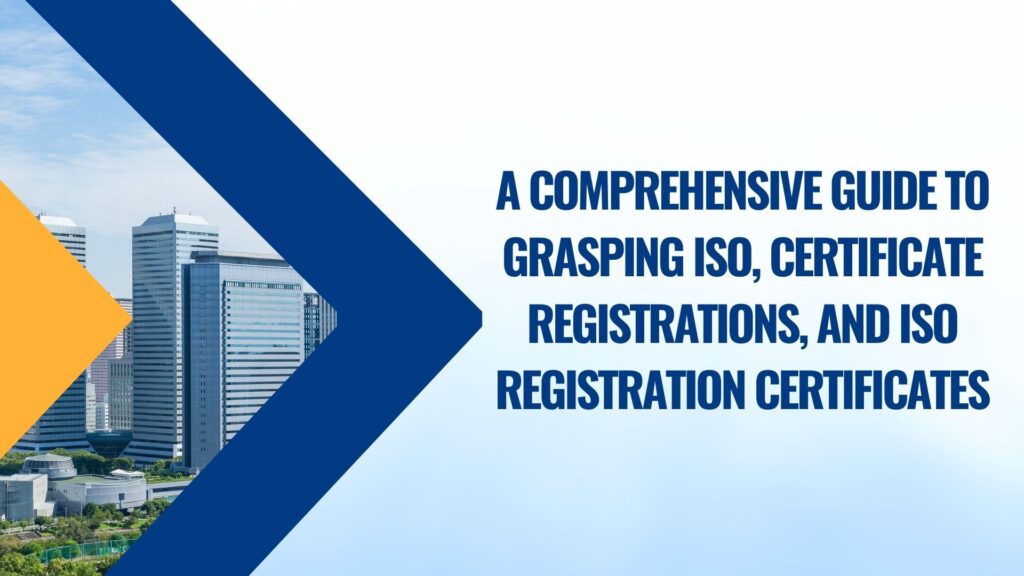Introduction:
In the dynamic and competitive landscape of the business world, organizations are constantly seeking ways to enhance their credibility, streamline operations, and meet international standards. One key avenue for achieving these goals is through the implementation of the International Organization for Standardization (ISO) standards. In this comprehensive guide, we delve into the intricacies of ISO, certificate registrations, and the significance of ISO registration certificates in ensuring quality management within an organization.
Understanding ISO
What is ISO?
The International Organization for Standardization (ISO) is a globally recognized entity that develops and publishes international standards to ensure the quality, safety, efficiency, and interoperability of products, services, and systems. ISO standards cover a broad spectrum of industries, from manufacturing and technology to healthcare and environmental management.
The Importance of ISO Standards
ISO standards provide a framework for organizations to implement best practices, improve processes, and meet regulatory requirements. Adhering to ISO standards not only enhances the efficiency of internal operations but also fosters trust among stakeholders, customers, and partners.
Certificate Registrations
Types of ISO Certifications
ISO offers a variety of certifications tailored to different industries and organizational needs. Common certifications include ISO 9001 for Quality Management, ISO 14001 for Environmental Management, ISO 27001 for Information Security Management, and many more. Each certification addresses specific aspects of business operations.
The Certification Process
Achieving ISO certification involves a systematic approach. Organizations typically go through a series of steps, including gap analysis, documentation of processes, implementation of improvements, and a final audit by a certified body. The certification process ensures that the organization complies with the relevant ISO standard.
ISO Registration Certificates
Significance of ISO Registration Certificates
The ISO registration certificate is tangible proof that an organization has successfully met the requirements of a specific ISO standard. This certificate serves as a testament to the organization’s commitment to quality management and adherence to international standards. It is often a prerequisite for participating in tenders, winning contracts, and expanding into new markets.
Validity and Renewal
ISO registration certificates are typically valid for a specific period, after which organizations must undergo a renewal process to demonstrate continued compliance. Regular audits ensure that organizations uphold the standards and continually improve their processes.
Challenges and Benefits
Challenges of ISO Implementation
While the benefits of ISO certification are substantial, organizations often face challenges during the implementation process. These may include resistance to change, resource constraints, and the need for continuous improvement. Addressing these challenges is crucial for a successful ISO journey.
Benefits of ISO Certification
The benefits of obtaining ISO certification are far-reaching. From improved customer satisfaction and enhanced market reputation to increased operational efficiency and access to new business opportunities, ISO certification contributes significantly to an organization’s overall success.
Industry-Specific Considerations
Tailoring ISO Standards to Industry Needs
Different industries have unique challenges and requirements. ISO standards can be adapted to specific industry nuances, ensuring that organizations can align their processes with industry best practices. This adaptability is crucial for organizations operating in diverse sectors, ranging from healthcare and finance to manufacturing and technology.
Integrated Management Systems
In pursuit of operational excellence, many organizations opt for integrated management systems that combine multiple ISO standards. This approach allows them to address various aspects simultaneously, such as quality, environment, and information security. Integrated management systems streamline processes and minimize duplication, making it more efficient for organizations to achieve and maintain certification.
Continuous Improvement and Evolving Standards
The Role of Continuous Improvement
ISO certification is not a one-time achievement but an ongoing commitment to improvement. Organizations are encouraged to embrace the philosophy of continuous improvement, known as the Plan-Do-Check-Act (PDCA) cycle, to enhance their processes continually. This iterative approach ensures that organizations remain adaptable and resilient in the face of changing business landscapes.
Evolving ISO Standards
ISO standards are periodically reviewed and updated to reflect changes in technology, industry practices, and global regulations. Organizations must stay informed about these updates to ensure ongoing compliance. Adapting to the latest standards demonstrates a commitment to staying at the forefront of industry advancements and maintaining a competitive edge.
Case Studies and Success Stories
Real-world Examples of ISO Success
Examining case studies and success stories of organizations that have successfully implemented ISO standards provides valuable insights and inspiration. These stories showcase the tangible benefits, challenges overcome, and the transformative impact that ISO certification can have on an organization’s trajectory.
Note: You Can Apply for ISO 50001 Certification
Conclusion:
Grasping ISO, certificate registrations, and ISO registration certificates is essential for organizations aspiring to thrive in today’s competitive business environment. ISO standards provide a roadmap for organizations to enhance their processes, meet international benchmarks, and gain a competitive edge. By understanding the intricacies of ISO, embarking on the certification journey, and valuing the significance of ISO registration certificates, organizations can not only ensure quality management but also position themselves as leaders in their respective industries.



